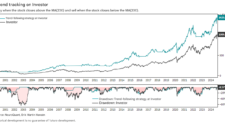Why price is your best friend – and predictions your worst enemy

Investors have long been fascinated by the idea of predicting which companies will deliver strong future earnings. It makes sense: if you can predict future earnings, it should be easy to beat the market. But what if I told you that even with perfect information about future earnings, you would still likely fail to generate excess returns? It’s a conclusion that multiple studies support—and here’s why you should focus on price and systematic strategies instead of trying to become the next “oracle.”
Studies showing that future profit development is not enough
1. The study by Dreman and Berry (1995)
David Dreman and Michael A. Berry published a study in Financial Analysts Journal where they examined the relationship between earnings forecasts and stock returns. They found that even if one could correctly predict a company's future earnings, it would be difficult to achieve excess returns because the market already discounts this information in stock prices.
Quote from the study:
“There is a surprisingly low correlation between earnings growth and stock returns. The market often prices in expected earnings growth long before it materializes.”
2. Rouwenhorst (1998): Momentum strategies outperform fundamental predictions
Another important study by K. Geert Rouwenhorst showed that momentum strategies, which completely ignore fundamental factors and focus on price movements, consistently outperformed the market in both developed and emerging economies.
Conclusion: Momentum strategies focus on what the market is actually doing, rather than what we think it should be doing based on fundamental factors.
3. Sloan (1996): The Mispricing of Accruals
Richard Sloan showed in a study that the market often misprices companies based on differences between cash flows and reported earnings. This suggests that even accurate earnings information does not always lead to fair valuations – the market is too complex and often irrational.
4. Lakonishok, Shleifer and Vishny (1994): Against intuition
In a study on value investing, researchers found that the market systematically overvalues growth companies and underestimates value companies. Here too, they found that market pricing is a more important factor than the companies' fundamentals.
Why systematic strategies are superior
1. Price is objective, fundamentals are subjective
Interpreting company fundamentals is often a subjective process. What factors are most important? How should they be valued? Price, on the other hand, is a pure reflection of the market's collective opinions and sentiment. Systematic strategies use this objective measure as a basis for decisions.
2. The market is not rational – and neither are you
Even with perfect information, it is difficult to predict how the market will react. Studies show that investors tend to overreact, underreact, and be guided by emotion rather than logic. Systematic strategies eliminate this human weakness.
3. Momentum and trend work
Momentum and trend-following strategies, which focus solely on price and not fundamental factors, have proven effective time and again. For example, 12-month momentum has shown a strong positive correlation with future returns in several studies.
4. Risk management is automatically integrated
Systematic strategies are not just tools for finding winners; they can also be built to manage risk. By using volatility-adjusted portfolio weights or stop-loss rules, you can create more stable and consistent returns.
Future profits vs. price: An example
Let’s say you knew that Company A would double its profits next year. That sounds like a safe investment, right? The problem is that the market may already be expecting this growth. If Company A instead reports “only” an 80% increase, the stock price may actually fall because it didn’t meet expectations. Price tells all of this much better than fundamentals – and does so without guesswork.
Conclusion: Focus on what works
Trying to beat the market by predicting future earnings trends is often a futile task. Research shows that the market is too efficient and complex to be consistently outsmarted in this way. By focusing on price and using systematic strategies instead, you can take advantage of market dynamics rather than fighting them.
So, what do you choose?
Do you want to play the game of predictions, or do you want to follow what actually works? Systematic strategies offer a path forward that is not only simpler but also more proven to be successful. We use not only price, but also fundamental factors in two of our systematic model portfolios. However, these are facts based on fundamentals, not subjective opinions on the fundamentals of companies.
References:
- Dreman, D. N., & Berry, M. A. (1995). Forecasting Errors and Their Implications for Stock Returns. Financial Analysts Journal.
- Rouwenhorst, KG (1998). International Momentum Strategies. Journal of Finance.
- Sloan, R. G. (1996). Do Stock Prices Fully Reflect Information in Accruals and Cash Flows about Future Earnings?. The Accounting Review.
- Lakonishok, J., Shleifer, A., & Vishny, R. W. (1994). Contrarian Investment, Extrapolation, and Risk. Journal of Finance.


